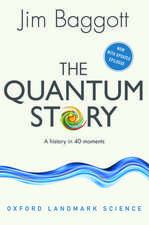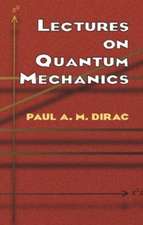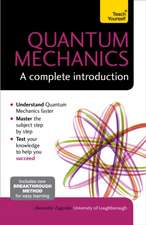Conceptual Foundations of Quantum Physics: An Overview from Modern Perspectives
Autor Dipankar Homeen Limba Engleză Hardback – 29 noi 1997
| Toate formatele și edițiile | Preț | Express |
|---|---|---|
| Paperback (1) | 1221.20 lei 43-57 zile | |
| Springer Us – 29 apr 2013 | 1221.20 lei 43-57 zile | |
| Hardback (1) | 1228.96 lei 43-57 zile | |
| Springer Us – 29 noi 1997 | 1228.96 lei 43-57 zile |
Preț: 1228.96 lei
Preț vechi: 1498.73 lei
-18% Nou
Puncte Express: 1843
Preț estimativ în valută:
235.16€ • 246.15$ • 195.73£
235.16€ • 246.15$ • 195.73£
Carte tipărită la comandă
Livrare economică 31 martie-14 aprilie
Preluare comenzi: 021 569.72.76
Specificații
ISBN-13: 9780306456602
ISBN-10: 0306456605
Pagini: 386
Ilustrații: XVII, 386 p.
Dimensiuni: 155 x 235 x 27 mm
Greutate: 0.77 kg
Ediția:1997
Editura: Springer Us
Colecția Springer
Locul publicării:New York, NY, United States
ISBN-10: 0306456605
Pagini: 386
Ilustrații: XVII, 386 p.
Dimensiuni: 155 x 235 x 27 mm
Greutate: 0.77 kg
Ediția:1997
Editura: Springer Us
Colecția Springer
Locul publicării:New York, NY, United States
Public țintă
ResearchDescriere
It may tum out that, like certain other phenomena studied by sociologists, bouts of interest in the foundations of quantum mechanics tend to come in 60-year cycles. It is hardly surprising that in the first decade or so of the subject the conceptual puzzles generated by this strange new way of looking at the world should have generated profound interest, not just among professional physicists themselves but also among philosophers and informed laymen; but this intense interest was followed by a fallow period in the forties and fifties when the physics establishment by and large took the view that the only puzzles left were the product either of incompetent application of the formalism or of bad philosophy, and only a few brave individualists like the late David Bohm dared to suggest that maybe there really was something there after all to worry about. As Bell and Nauenberg, surveying the scene in 1966, put it: "The typical physicist feels that [these questions 1 have long ago been answered, and that he will fully understand how if ever he can spare twenty minutes to think about it. " But gradually, through the sixties and seventies, curiosity did revive, and the last ten years or so have seen a level of interest in foundational questions, and an involvement in them by some of the leading figures of contemporary physics, which is probably unparalleled since the earliest days.
Cuprins
The Standard Interpretation and Beyond. The Quantum Measurement Paradox. Classical Limit of Quantum Mechanics. Quantum Nonlocality. Wave-Particle Duality of Light and Complementarity. Quantum Zeno Effect. Causality in Quantum Mechanics. Einstein's Critique of Quantum Mechanics: An Appraisal from Modern Perspectives. Index.
Recenzii
`While the last few years have seen a plethora of books on the conceptual problems of quantum mechanics for a lay reader, I believe the present book will fill a special niche. On the one hand, Dipankar Home writes on the assumption that his reader is a professional physicist, or at least will be able to follow complex technical discussions, and thus keeps the argument on a rigorous level, without the oversimplification that inevitably have to be made in books for a lay readership. On the other hand, he does not, unlike some other books in this category, assume a priori that quantum mechanics is the ultimate truth about the world and/or that worries about the conceptual foundations merely reflect an inadequate appreciation of the subtleties involved in applying it. Indeed a major theme of the book is the profound and fundamental difficulties which any version of the "orthodox" interpretation has in explaining the existence, in our everyday experience, of the definite outcomes to experiments where the final state predicted by quantum mechanics is a superposition - the classic "quantum measurement paradox," which in his opinion (and mine!) has got no nearer a solution for all the words expended on it over the last sixty years. At the same time, he does not advocate a particular line of solution to this problem to the exclusion of all others; rather, his emphasis is on the different kinds of experimental test that someday may (or may not!) set limits to the validity of the quantum description and/or prove one or other of these "non-standard" approaches correct. [...] I believe that this book is essential reading for any physicist who is seriously concerned about the foundations of the theory which, for all its curious and counterintuitive aspects, is still (to adapt a famous characterization by a former British Cabinet member of the prime minister of the day) "the best theory of the world we've got".'
From the Foreword by: Anthony Leggett, University of Illinois at Urbana-Champaign, Nobel Laureate 2003
`...after having spent a career worrying about many of the fundamental problems that beset quantum theory, [the author] has set down his feelings about what he thinks the best proposed solutions are. This he has done by first discussing each topic, the problems involved, and the various contributions of almost everyone who has contributed to understanding the problem. not hesitate to add his own opinions and preferences, but to do that is of course the point of writing the book. ...it is really a wonderful book. ...one will appreciate the careful discussion of many sides of important arguments, and there is much to learn from the book.'
Daniel Greenberger, Foundations of Physics, 31:5 (2001)
From the Foreword by: Anthony Leggett, University of Illinois at Urbana-Champaign, Nobel Laureate 2003
`...after having spent a career worrying about many of the fundamental problems that beset quantum theory, [the author] has set down his feelings about what he thinks the best proposed solutions are. This he has done by first discussing each topic, the problems involved, and the various contributions of almost everyone who has contributed to understanding the problem. not hesitate to add his own opinions and preferences, but to do that is of course the point of writing the book. ...it is really a wonderful book. ...one will appreciate the careful discussion of many sides of important arguments, and there is much to learn from the book.'
Daniel Greenberger, Foundations of Physics, 31:5 (2001)

















